How To : Use the nominal phrase in English Grammar
Yossarian the Grammarian talks about nominal phrases (noun phrases), and shows that phrases can contain clauses. Great English grammar lesson for ESL students.

Yossarian the Grammarian talks about nominal phrases (noun phrases), and shows that phrases can contain clauses. Great English grammar lesson for ESL students.
This ESL how to video shows how the transition word "however" is used between two clauses. It can go at the beginning of a sentence, but it's usually in the middle. It also is used to say that something will be done in whatever way possible. Watch this tutorial and you will be ...more
Learn common American phrases with this helpful interview. We will dissect the conversation and explain useful phrases. Perfect for ESL students.
In this episode you will learn "yes and no" questions and how to make your voice go up at the end of those questions. This video is great for advanced, intermediate, and beginner learning to speak the English as a second language (ESL).
Learn how you can use the passive voice in the future tense in this ESL tutorial. To make the future tense passive in English, use "will be" and then the past participle. "Will" is a modal verb, so this formula applies to other modals such as can, may, must, might, etc. Watch ...more
In this episode learn useful idioms in the English language. This video is great for advanced, intermediate, and beginner learning to speak the English as a second language (ESL).
Yossarian the Grammarian gives you the lowdown on participial phrases. Great English grammar lesson for ESL students.
Learn from Yossarian the Grammarian about infinitive phrases (to run, to learn, to cook, etc.), which function as adjectives, adverbs, and nouns. Great English grammar lesson for ESL students.
In this episode learn legal terms like "to sue" "to charge" This video is great for advanced, intermediate, and beginner learning to speak the English as a second language (ESL).
A lot of the English you hear in the real world isn't taught in the classroom. Swearing is important to know about if you're going to speak English. In this ESL how to video, you'll learn about the difference between 'bitch' and 'slut' which many ESL speakers confuse. If you l ...more
ESL teacher Jennifer Lebedev teaches the proper usage of the English verb 'be' in the present tense. The verb 'be' has three forms in the present tense: 'am', 'is', 'are'. Sentences are formed with a subject and a verb. To make sentences with the verb 'be', use the correct for ...more
In this ESL tutorial you will learn how to use the passive voice in the past continuous tense in Englishi. The passive voice is the form of a transitive verb, that requires both a subject and one or more objects. To put the past continuous tense into the passive voice, use "wa ...more
Learn how to use the future perfect tense in English with this ESL tutorial. The future perfect is the perfect tense for setting goals with deadlines. A deadline is a date that you must complete an activity or job. For example, by this time next year, what will you have achiev ...more
Yossarian puts an end to the confusion surrounding case (the thing you wonder about when you're wavering between "I" and "me", "we" or "us", and so on). Great English grammar lesson for ESL students. Part 1 of 2 - How to Understand pronoun case in English grammar. Part 2 of 2 ...more
A lot of the English you hear in the real world isn't taught in the classroom. This ESL tutorial gives examples of how people use "messed up", "screwed up" and "f*d up". This is real life and you need to know how to respond if someone says these things to you. Watch this how t ...more
Straight talk from Yossarian the Grammarian on past and present participles. Great grammar lesson for ESL students.
Yossarian the Grammarian lays bare the nature of the indirect object and the much less well known objective complement. Great English grammar lesson for ESL students.
"Would rather" is used to show a preference for one thing over another. What do you want to do today, go to the beach or go to work? I would rather go to the beach. Or, I'd rather go to the beach. In this ESL how to video you will learn the use of the phrase "would rather" in ...more
Accurate Search for International ESL/EFL Teaching Jobs. Covers Dave's ESL Cafe, Craigslist (edu jobs in Asian capitals), dozens of major ESL job sites, and in total indexes 3 million+ pages. Want to teach & travel?
A lot of the English you hear in the real world isn't taught in the classroom. The F word is a word you hear all the time and you're going to need to know how to respond. This ESL tutorial is all about the F word and how people use it on a daily basis. Watch this how to video ...more
 How To:
Export or Import Your Safari Browsing Data Between Browsers on iPhone, iPad, and Mac
How To:
Export or Import Your Safari Browsing Data Between Browsers on iPhone, iPad, and Mac
 How To:
The Complete iOS 18.2 Features Guide — Here's Everything New and Improved for Your iPhone
How To:
The Complete iOS 18.2 Features Guide — Here's Everything New and Improved for Your iPhone
 How To:
Set a Maximum Volume Limit for Your iPhone or iPad's Speakers to Prevent Loud Audio Surprises
How To:
Set a Maximum Volume Limit for Your iPhone or iPad's Speakers to Prevent Loud Audio Surprises
 How To:
13 Ways iOS 18 Improves Your iPhone's Camera App for Even Better Photos and Videos
How To:
13 Ways iOS 18 Improves Your iPhone's Camera App for Even Better Photos and Videos
 How To:
Apple Just Added Sudoku to Apple News — Here's How to Play It on iPhone, iPad, and Mac
How To:
Apple Just Added Sudoku to Apple News — Here's How to Play It on iPhone, iPad, and Mac
 How To:
Unlock the Power of Visual Intelligence on Your iPhone to Translate and Explore the World Around You
How To:
Unlock the Power of Visual Intelligence on Your iPhone to Translate and Explore the World Around You
 How To:
Generate Professional Drawings in Seconds Using Image Wand on iOS 18.2 or iPadOS 18.2
How To:
Generate Professional Drawings in Seconds Using Image Wand on iOS 18.2 or iPadOS 18.2
 How To:
Use Genmoji to Create Custom Emoji That Work Just Like Regular Emoji in Messages, Notes, and More
How To:
Use Genmoji to Create Custom Emoji That Work Just Like Regular Emoji in Messages, Notes, and More
 How To:
Make Typing Text Easier to Read on iPhone, iPad, or Mac with Apple's Hover Typing Tool
How To:
Make Typing Text Easier to Read on iPhone, iPad, or Mac with Apple's Hover Typing Tool
 How To:
Change the Default Web Browser App on Your iPhone to Open Links in Chrome, Firefox, Safari, and More
How To:
Change the Default Web Browser App on Your iPhone to Open Links in Chrome, Firefox, Safari, and More
 How To:
Use Apple Intelligence's Image Playground to Craft Custom Drawings and Animations for Almost Anything You Can Think Of
How To:
Use Apple Intelligence's Image Playground to Craft Custom Drawings and Animations for Almost Anything You Can Think Of
 How To:
Follow the 2024 Election Results in Real Time with Apple News' Live Activity for iPhone, iPad, and Apple Watch
How To:
Follow the 2024 Election Results in Real Time with Apple News' Live Activity for iPhone, iPad, and Apple Watch
 How To:
Experience Music on Your iPhone Like Never Before with Music Haptics, Which Lets You Feel Every Beat
How To:
Experience Music on Your iPhone Like Never Before with Music Haptics, Which Lets You Feel Every Beat
 How To:
Generate Text, Images, and Insights with Apple Intelligence's Built-in ChatGPT Integration
How To:
Generate Text, Images, and Insights with Apple Intelligence's Built-in ChatGPT Integration
 How To:
Remove Unwanted Objects, People, and Distractions in Photos on Your iPhone, iPad, or Mac
How To:
Remove Unwanted Objects, People, and Distractions in Photos on Your iPhone, iPad, or Mac
 How To:
New Menu Lets You Set Default Apps on Your iPhone or iPad for Calling, Messaging, Emailing, Web Browsing, and More
How To:
New Menu Lets You Set Default Apps on Your iPhone or iPad for Calling, Messaging, Emailing, Web Browsing, and More
 How To:
30 Must-Know New Features in iOS 18.1 and iPadOS 18.1 That'll Make You Want to Update
How To:
30 Must-Know New Features in iOS 18.1 and iPadOS 18.1 That'll Make You Want to Update
 How To:
Easily Record Phone Calls on Your iPhone and Get Auto-Generated Transcripts and Summaries
How To:
Easily Record Phone Calls on Your iPhone and Get Auto-Generated Transcripts and Summaries
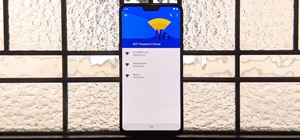 How To:
See Passwords for Wi-Fi Networks You've Connected Your Android Device To
How To:
See Passwords for Wi-Fi Networks You've Connected Your Android Device To
 How To:
The Complete iOS 18.2 Features Guide — Here's Everything New and Improved for Your iPhone
How To:
The Complete iOS 18.2 Features Guide — Here's Everything New and Improved for Your iPhone
 How To:
Remove Unwanted Objects, People, and Distractions in Photos on Your iPhone, iPad, or Mac
How To:
Remove Unwanted Objects, People, and Distractions in Photos on Your iPhone, iPad, or Mac
 How To:
Create the Most Compact 2x2 Hidden Piston Door in Under 50 Seconds!
How To:
Create the Most Compact 2x2 Hidden Piston Door in Under 50 Seconds!
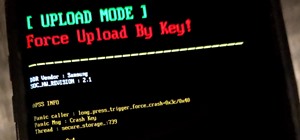 How To:
Use Odin to Flash Samsung Galaxy Stock Firmware
How To:
Use Odin to Flash Samsung Galaxy Stock Firmware
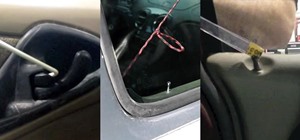 How To:
Open Your Car Door Without a Key: 6 Easy Ways to Get in When Locked Out
How To:
Open Your Car Door Without a Key: 6 Easy Ways to Get in When Locked Out
 How To:
Make an Origami Christmas Star
How To:
Make an Origami Christmas Star
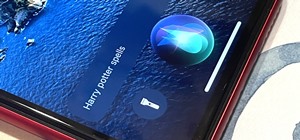 How To:
16 Harry Potter Spells for Siri That Turn Your iPhone into a Magical Elder Wand
How To:
16 Harry Potter Spells for Siri That Turn Your iPhone into a Magical Elder Wand
 How To:
20 Surprisingly Practical Uses for Apple AirTags
How To:
20 Surprisingly Practical Uses for Apple AirTags
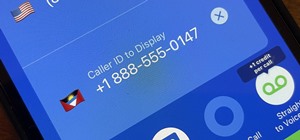 How To:
Make Spoofed Calls Using Any Phone Number You Want Right from Your Smartphone
How To:
Make Spoofed Calls Using Any Phone Number You Want Right from Your Smartphone
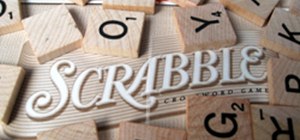 How To:
Master SCRABBLE & Win Every Game
How To:
Master SCRABBLE & Win Every Game
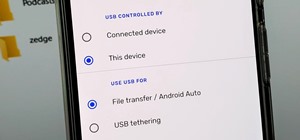 How To:
Make the USB Connection on Your Android Phone Default to File Transfer Mode
How To:
Make the USB Connection on Your Android Phone Default to File Transfer Mode
 How To:
Set a GIF as a Live Wallpaper for Your iPhone's Lock Screen Background
How To:
Set a GIF as a Live Wallpaper for Your iPhone's Lock Screen Background
 How To:
Secretly Take Photos on Android Without Launching Your Camera App
How To:
Secretly Take Photos on Android Without Launching Your Camera App
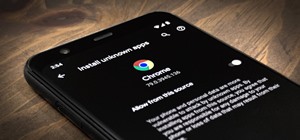 Android 101:
How to Sideload Apps by Enabling 'Unknown Sources' or 'Install Unknown Apps'
Android 101:
How to Sideload Apps by Enabling 'Unknown Sources' or 'Install Unknown Apps'
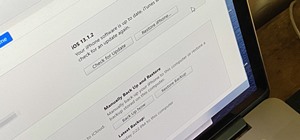 How To:
Restore Your iPhone to a Backup or Factory Settings Using iTunes on macOS or Windows
How To:
Restore Your iPhone to a Backup or Factory Settings Using iTunes on macOS or Windows
 How To:
Building a Steampunk Hand Cannon, Part 1: How to Make a Wooden Gun Stock
How To:
Building a Steampunk Hand Cannon, Part 1: How to Make a Wooden Gun Stock
 How To:
Use FaceTime's Secret Hand Gestures and Reaction Buttons to Add Animated On-Screen Effects to Your Video Feed
How To:
Use FaceTime's Secret Hand Gestures and Reaction Buttons to Add Animated On-Screen Effects to Your Video Feed
 How To:
Create an Admin User Account Using CMD Prompt (Windows)
How To:
Create an Admin User Account Using CMD Prompt (Windows)
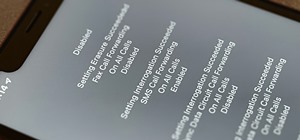 How To:
Dial These Secret Codes to See if Someone Is Hijacking Calls & Texts on Your iPhone
How To:
Dial These Secret Codes to See if Someone Is Hijacking Calls & Texts on Your iPhone
 Android Basics:
How to See What Kind of Processor You Have (ARM, ARM64, or x86)
Android Basics:
How to See What Kind of Processor You Have (ARM, ARM64, or x86)
 How To:
Roll Sushi—The Ultimate Guide
How To:
Roll Sushi—The Ultimate Guide
 How To:
Clear Your Frequently Used and Recent Emoji from Your iPhone's Keyboard
How To:
Clear Your Frequently Used and Recent Emoji from Your iPhone's Keyboard
 How To:
Revive a Stale Baguette Using the Miraculous Water Trick
How To:
Revive a Stale Baguette Using the Miraculous Water Trick
 How To:
Play The Card Game "Judgment"
How To:
Play The Card Game "Judgment"
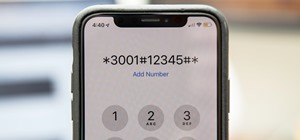 How To:
100+ Secret Dialer Codes for Your iPhone
How To:
100+ Secret Dialer Codes for Your iPhone
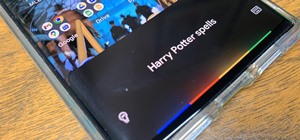 How To:
19 Harry Potter Spells Your Android Phone Can Cast Using Google Assistant
How To:
19 Harry Potter Spells Your Android Phone Can Cast Using Google Assistant
 How To:
If 'Messages' Consumes Too Much iPhone or iCloud Storage, Don't Delete Your Conversations Just Yet
How To:
If 'Messages' Consumes Too Much iPhone or iCloud Storage, Don't Delete Your Conversations Just Yet
 How To:
Prevent Thieves from Turning On Your iPhone's Airplane Mode, So You Have a Better Chance to Track It Down
How To:
Prevent Thieves from Turning On Your iPhone's Airplane Mode, So You Have a Better Chance to Track It Down
 How To:
The Trick That Lets You Link to Specific Start Times in YouTube Videos Right from Your Phone
How To:
The Trick That Lets You Link to Specific Start Times in YouTube Videos Right from Your Phone
 Modular Origami:
How to Make a Cube, Octahedron & Icosahedron from Sonobe Units
Modular Origami:
How to Make a Cube, Octahedron & Icosahedron from Sonobe Units
 How To:
13 Tips Every Apple Pencil User Needs to Know for iPad
How To:
13 Tips Every Apple Pencil User Needs to Know for iPad
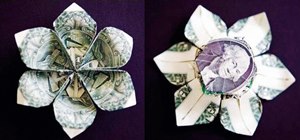 Money Origami, Flower Edition:
10 Different Ways to Fold a Dollar Bill into a Blossoming Bloom
Money Origami, Flower Edition:
10 Different Ways to Fold a Dollar Bill into a Blossoming Bloom
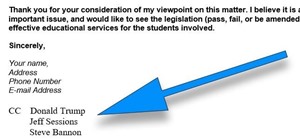 How To:
CC in a Physical Business Letter
How To:
CC in a Physical Business Letter
 How To:
11 Ways Apple's Reminders App Is Even Better with iOS 18, iPadOS 18, and macOS 15
How To:
11 Ways Apple's Reminders App Is Even Better with iOS 18, iPadOS 18, and macOS 15
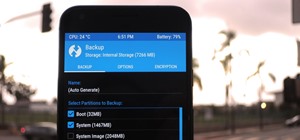 TWRP 101:
How to Make a NANDroid Backup & Restore Your Entire Phone
TWRP 101:
How to Make a NANDroid Backup & Restore Your Entire Phone
 How To:
Generate Text, Images, and Insights with Apple Intelligence's Built-in ChatGPT Integration
How To:
Generate Text, Images, and Insights with Apple Intelligence's Built-in ChatGPT Integration
 The Ultimate Onion Cheat Sheet:
Which Onion Goes Best with What?
The Ultimate Onion Cheat Sheet:
Which Onion Goes Best with What?
 Popup Killer:
How to Bypass Website Barriers Without Signing Up or Completing Surveys
Popup Killer:
How to Bypass Website Barriers Without Signing Up or Completing Surveys
 VLC 101:
How to Stream Movies from Your Computer to Your Android Phone
VLC 101:
How to Stream Movies from Your Computer to Your Android Phone